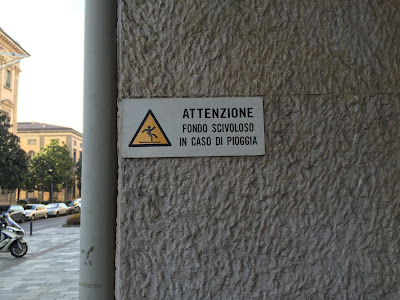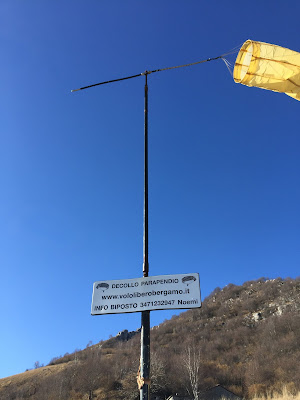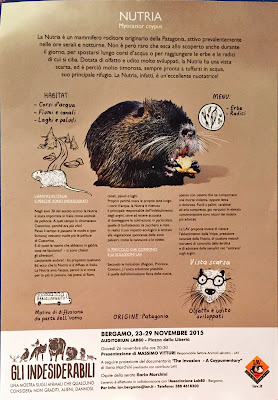previous lesson | this lesson | next lesson
In a previous post Bergamo – Street Street Language Lesson I, we talked about Italian signs as mini-language lessons. I’ll add here that signs also remind us where we’ve been in our travels in and around Bergamo. Here’s a batch of another eight signs.
abituati ad avere di piu – “get used to having more”
We saw this lottery advertisement in a tabaccheria, where we stopped to ask a question. We patiently waited our turn as two elderly people played their numbers and bought lottery tickets. The verb abituare (using the friendly imperative form, abituta + ti) means to get used to something. The selling of the slim probability of winning the lottery works in all languages. Then again, there is the story of the schoolboy in Naples that won big according to this article, which went on to note that "[u]nder Italian law children are forbidden to gamble - but they are allowed to take part in the national lottery."

attenzione - fondo scivoloso in caso di piogga – “attention – slippery in rain”
Pioggia is rain. In English, we say slippery when wet. We spotted this along the quiet and classy via Torquato Tasso.

avvia Windows normalmente – “start Windows normally”
The verb avviare means to start or power up. Here we are staring at a screen waiting for the computer to start at the University of Bergamo. We were about to take the CIS - Centro di italiano per stranieri test to determine our Italian level for classes.

decollo parapendio – “paraglider launch site”
The verb decollare is to take off or launch. The noun decollo is a launch site, and the noun parapendio is a paraglider. According to the Italian Wiktionary site, parapendio derives from pendio, which means slope. We were on our way to Monte Linzone (1392 m) and saw this sign.

credi di consocermi davvero? – “Do you think you really know me?”
We saw this flyer around Bergamo announcing a presentation on the nutria (or coypu). According to the flyer, this South American rodent was introduced to Italy in the 1920s for its fur, which was in style at the time. It was commonly called castorino, derived from the scientific name of the nutria, Mycastor coypus, and the Italian custom of using diminutives, “ino” in this case. Over time, the demand for nutria fur declined, and the nutria really took to its new home in the Po River Valley. It is now considered a pest that causes significant damage to the environment.


non lasciarmi nel computer, stampami! – “don’t leave me in your computer, print me!”
We stopped at Brunel Foto to get some photos taken. A sexy model on a large poster hanging in the shop beckons customers to bring in their photos for printing, stampare. Imperative forms (stampa) with the object tacked on the end (mi) sound funny to me. A sexy woman saying stampami evokes different images in my mind.

passagio per caprioli mufloni e altri cornuti! – “passage for roe deer, mouflon and other cuckolds”
Caprioli (singular capriolo) are wild deer, Capreolus capreolus. Mufloni (singular muflono) are wild sheep, Ovis orientalis. Altri cornuti is a play on words referring to other horned animals like cuckolds, which in Italian is cornuto, or horned. We saw this sign while hiking above Brunate (above Como), in a day outing from Bergamo. The sign signaled why there is an opening in a fence. Thanks to R. for helping decode this.

usare gli appositi guanti – “use the gloves provided”
I mention this instructional sign, because choosing fruit and vegetables in Italy can be tricky. In a supermercato like PAM, Esselunga, or Carrefour, you don a plastic glove before touching loose fruit or vegetables. You also put items in a bag and print out a label. Do not touch the produce with your bare hands! In a fruttivendolo, a local, neighborhood produce store, you just point at what you want and someone in the shop picks and packages your produce for you.

No comments:
Post a Comment
All comments are moderated. If your comment doesn't appear right away, it was likely accepted. Check back in a day if you asked a question.